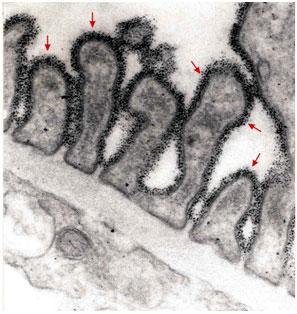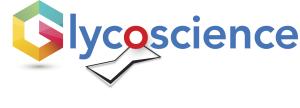What is the Alliance of Glycobiologists for Cancer Research?
The Alliance is a trans-National Institutes of Health initiative to discover and develop new classes of molecular markers that can be used to detect cancer early. This effort seeks to discover, develop, and clinically validate cancer biomarkers by targeting complex carbohydrates, or the "glycan," part of a molecule.
Biomarkers are substances that can be found in the blood, other body fluids, or tissues, and used to measure informative biological processes. In addition to genes and proteins, they can be complex carbohydrate (sugar) structures that are attached to protein and lipid (fat) molecules.
10 NCI-Supported Tumor Glycomics Laboratories make up the primary component of the Alliance. The Common Fund Glycoscience Program funded by the NIH Office of Strategic Coordination (OSC), the Consortium for Functional Glycomics (CFG), and NCI's Early Detection Research Network (EDRN) are the partnering components.
Why was the Alliance created?
Glycomic biomarkers based on the carbohydrate portion of a glycoprotein represent a largely untapped arena relevant to cancer detection and diagnosis. The goal of this program is to identify clinically-relevant glycans that can enhance diagnostic performance, either alone or in combination with existing markers. Since no single institution or individual has the resources or expertise to expand the existing knowledge of glycobiology in relation to cancer, NCI in 2007 launched the Alliance of Glycobiologists for Detection of Cancer to bring together groups and individuals in a focused endeavor. In 2018, the name of the program was changed to the Alliance of Glycobiologists for Cancer Research.
What are glycans?
Glycans are sugars that are linked together, often forming complex branched-chain structures, and which are bound to proteins and lipids. Glycans dominate the surfaces of cells and are known to mediate many biological processes. (See Figure 1.) Humans are believed to synthesize thousands of glycan structures. While there are about 7,000 known structures, their significance in cancer progression, diagnosis and treatment is yet to be fully established. Glycans are extremely abundant, but recent advances in technology have only now allowed a systematic study of them. Many current cancer biomarkers are glycoproteins, but little effort has been taken to exploit their glycan structures to improve diagnostic performance.
What is glycomics?
Glycomics is a field that overlaps proteomics in covering certain post-translational modifications (PTMs) of proteins. Glycomics is becoming a driving force for discovering potential cancer biomarkers. Changes in PTMs often result in pathophysiologic conditions, and underpin the multitude of potential biomarkers associated with proteins.
Recent evidence suggests that cancers may always display alterations in glycan structures attached to proteins. Numerous studies comparing normal and tumor cells have shown that changes in the glycan structures of cells correlate with cancer development. Many protein biomarkers also have glycan components and analysis of these two molecular structures together may improve the value of other existing tests.
What does the Alliance do?
The NCI-funded Tumor Glycomics Laboratories are searching for glycan-based biomarkers for detecting breast, ovarian, lung, prostate, colon, brain and pancreatic cancers. They also collaborate with other programs seeking cancer biomarkers. In working with NCI's Early Detection Research Network (EDRN), the Alliance brings together centers of expertise in tumor biology, diagnostic technologies, and clinical trial methodologies from academia, industry, and government.
Biological Tumor Laboratories
The goal is to advance our knowledge of altered glycosylation or other modifications in carbohydrate structure in cancer to determine whether it is the cause or the result of neoplastic transformation. The researchers will examine the biology of how modifications in carbohydrate structure influence malignancy during different stages of the disease. It is anticipated that the program will accelerate the translation of glycobiological data into clinical utility and application.

The Alliance awardees will function as an interactive network, including participating in joint research projects and working groups in:
- Encouraging and facilitating research on defining mechanisms of altered glycosylation and its role in carcinogenesis;
- Promoting trans-Network collaborative activities to enhance studies on glycosylation changes in cancer that can have a translational impact; and
- Promoting development of glycomic resources and data for sharing with the larger scientific community.
Members of the Alliance's Steering Committee (SC) oversee and coordinate activities. They review data; offer recommendations on strategies to expedite biomarker progression to validation status; determine when specific biomarker studies are ready for larger scale clinical validation; and monitor study results.
Specifically, the Alliance is working to:
- Identify oligosaccharide-based biomarkers specific to defined tumors that can be used for early detection, diagnosis, or risk assessment;
- Develop and apply glycan arrays for cancer biomarker discovery, validation and screening; and
- Develop and validate additional tools and reagents to enable high-throughput testing of glycomic biomarkers.
The Alliance is managed by its Steering Committee comprised of the principal investigators of the laboratories, representatives from the CFG and EDRN, and NIH program staff from NCI and NIGMS.
Who are the members of the Alliance and what are their project areas?
The Tumor Glycomics Laboratories are separated below by their research focus and listed in alphabetical order by the principal investigator. They offer varied expertise and technologies. More information is available via the links below.
Translational Tumor Glycomics Laboratories
- Karen L. Abbott
Institution: University of Oklahoma Health Sciences Center
Laboratory Project: Glycomics Laboratory for the Early Detection of Epithelial Ovarian Cancer (EOC)
- Brian B. Haab; Randy Brand
Institutions: Van Andel Research Institute; University of Pittsburgh
Laboratory Project: Subpopulations of Pancreatic Cancer Cells Defined by Glycan Markers
- David M. Lubman; Yehia Mechref
University of Michigan at Ann Arbor; Texas Tech University
Laboratory Project: Screening of Glycan Markers in Serum for Early Detection of HCC in Different Etiologies of Disease
- Anand S. Mehta; Richard Drake; Amit Singal; Yujin Hoshida
Institutions: Medical University of South Carolina; the University of Texas Southwestern
Laboratory Project: Glycopathology of HCC: Identification of the Source Cells of Serum Fucosylation
- Sharon Pitteri; Carolyn Bertozzi; James Brooks
Institution: Stanford University
Laboratory Project: Glycosylation and Immune Evasion in Urologic Tumors
Biological Tumor Laboratories
- Susan L. Bellis; Lance Wells
Institutions: University of Alabama at Birmingham; University of Georgia
Laboratory Project: Sialylation-dependent Mechanism Driving Pancreatic Cancer Progression
- Charles Dimitroff; Stuart Haslam
Institutions: Florida International University; Imperial College, London
Laboratory Project: Analysis of Glycomic Regulators in Melanoma Progression
- Mauricio Reginato; Lauren Ball
Institutions: Drexel University; Medical University of South Carolina
Laboratory Project: Role of O-GlcNAcome on Breast Cancer Initiating Cells
- Robert Sackstein
Institution: Florida International University
Laboratory Project: Analysis of E-selectin Ligands of Human Acute Leukemia Cells and their Biology in Leukemogenesis
- Lianchun Wang; Houjian Cai
Institutions: University of South Florida; University of Georgia
Laboratory Project: Heparan Sulfate in Prostate Cancer
How do the partnering groups work with the Alliance?
The Common Fund Glycoscience Program (CFG) (www.functionalglycomics.org) partner with the Tumor Glycomics Laboratories. For example, the Tumor Glycomics Laboratories can seek help with technical analysis of glycan profiles, access to glycan or "glyco-gene arrays", or obtain specific reagents and products. CFG offers many of the unique core resources that are specific to glycomics. The Common Fund labs have developed numerous tools to simplify the study of glycoscience.
The EDRN (edrn.nci.nih.gov), an NCI-funded consortium that promotes clinical validation of cancer biomarkers for early detection and cancer risk, will help the Alliance to validate glycomic cancer biomarkers. EDRN provides support for study design, statistical analysis, patient accrual, and collection of clinical specimens. EDRN also provides access to specifically designed reference sets (usually serum or plasma) for various cancers.
The Alliance collaborates with groups such as the Human Proteome Organization (https://hupo.org), through informal and formal arrangements, and with other NCI programs when needs arise, to derive maximum benefits from existing resources in the field.
What are the scientific objectives of the Alliance?
Objectives of the Alliance are:
- To support and facilitate a broad spectrum of research activities that identify cancer-related abnormalities associated with glycoconjugates having the potential to serve as cancer biomarkers. These research activities will involve a progression typified by: (a) the use of a variety of platforms and technologies for discovery of specific glycans or characteristics of glycan profiles that correlate with defined cancers; (b) the performance evaluation in terms of sensitivity and specificity of these biomarker candidates in case versus control clinical specimens; and (c) culmination in translational efforts to test the most promising biomarker candidates in clinical validation studies.
- To place highest priority on biomarkers for early detection and primary prevention of cancer, however, markers for diagnostic clinical testing of cancer or stratification of cancer risk also fulfill the mission of the Alliance. It is possible that markers for prognosis or prediction of response to therapy may arise from this research, and where appropriate, these additional biomarker applications may be explored.
- To function as a highly collaborative consortium facilitating cancer glycan biomarker discovery and development. Collaboration will be fostered through open discussion of research developments and discussions of strategies to most efficiently interrogate complex carbohydrates of clinical significance.
- To promote collaboration and communication with other relevant programs at the NCI, other Institutes within NIH, and academic and industrial leaders where the research interests coincide with the mission of the Alliance.
For more information, see the following:
Current Program Announcements
- "Alliance of Glycobiologists for Cancer Research: Translational Tumor Glycomics Laboratories (U01)", Funding Opportunity Announcement (FOA) Number PAR-17-206.
- "Alliance of Glycobiologists for Cancer Research: Translational Tumor Glycomics Laboratories (U01)", Funding Opportunity Announcement (FOA) Number PAR-17-207.
Former Funding Opportunity Announcements
- "Alliance of Glycobiologists for Detection of Cancer (U01)," Request for Application RFA-CA-11-009.
- "Alliance of Glycobiologists for Detection of Cancer and Cancer Risk (U01)," Request for Application RFA-CA-07-020.
